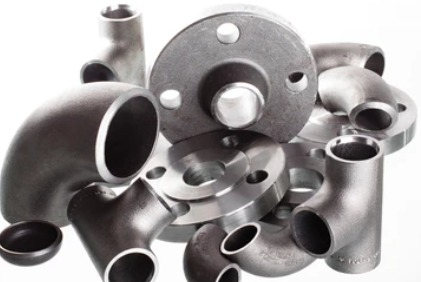Forged steel flanges play a pivotal role in various industries. They offer stability and durability in critical applications. They are essential components in piping systems, connecting pipes, valves, and other equipment. Crafted through a meticulous forging process, these flanges boast superior strength and resilience.
This article delves into the world of forged steel flanges. It unravels their manufacturing process, applications, and advantages.
What are Forged Flanges?
Forged flanges are essential components in various industries. They serve as robust connectors that join pipes, valves, and other equipment in fluid systems. Cast flanges are created by pouring molten metal into molds. In contrast, forged flanges undergo a meticulous shaping process. They are shaped through controlled deformation.
What are Steel Flanges Used For?
Steel flanges play a crucial role in facilitating fluid flow within piping systems. They provide a secure connection between pipes, valves, and other components. This ensures leak-free and efficient operations. These flanges are commonly used in industries such as oil and gas, petrochemicals, and manufacturing. They contribute to the overall stability and durability of the system.
Types of Forged Steel Flanges
Forged steel flanges come in various types, each designed for specific applications:
Weld Neck Flanges: Known for their structural integrity and ideal for high-pressure applications.
Slip-On Flanges: Easy to install and suitable for low-pressure systems.
Blind Flanges: Used to close the end of pipes and for easy inspection and maintenance.
Socket Weld Flanges: Well-suited for smaller-sized pipes and high-pressure conditions.
Lap Joint Flanges: Provide flexibility in aligning bolt holes and reducing stress in the piping system.
Forging Process
A. Raw Materials
1. Steel Selection:
Selecting the right steel is crucial for forging durable flanges. Common choices include carbon steel, alloy steel, and stainless steel. Each has unique properties suited to different environments and applications.
2. Quality Considerations:
Ensuring the quality of raw materials involves rigorous testing. This testing checks for factors such as tensile strength, impact resistance, and chemical composition. Quality considerations during this stage contribute to the overall reliability of the forged flanges.
B. Heating and Shaping
1. High-Temperature Forging:
The heating process involves exposing the raw steel to high temperatures. This makes it malleable for shaping. This critical step ensures that the material reaches the necessary plasticity. This allows for effective forging.
2. Precision Techniques:
Precision techniques, such as hammering and pressing, are used to shape the heated steel. They are shaped into the desired flange form. The controlled application of force during forging results in enhanced strength and durability.
Quality Standards and Certifications
It’s vital to adhere to industry standards. This guarantees the performance and safety of forged steel flanges. Certifications from reputable organizations, such as the American Society of Mechanical Engineers (ASME) and International Organization for Standardization (ISO), underscore the commitment to quality and compliance.
Benefits of Forged Steel Flanges
Forged steel flanges offer several advantages:
Superior Strength: The forging process enhances the structural integrity of the flanges, making them highly resistant to deformation.
Enhanced Durability: Quality materials and precise forging contribute to the longevity of forged flanges, even in harsh operating conditions.
Reliable Performance: The secure connections provided by forged flanges ensure consistent and reliable system performance.
Common Challenges and Solutions
A. Corrosion Issues
1. Protective Coatings:
Applying protective coatings, such as galvanization or specialized anti-corrosive treatments, safeguards forged flanges against corrosion, extending their lifespan.
2. Material Selection Strategies:
Choosing corrosion-resistant materials, such as stainless steel, is a proactive strategy. It combats corrosion challenges. It ensures sustained performance.
B. Compatibility Concerns
1. Flange and Pipe Matching:
Ensuring proper matching of flanges and pipes is essential to prevent compatibility issues. This also maintains the integrity of the fluid system.
2. Avoiding Leaks and Failures:
Adopting strict quality control measures during manufacturing and installation helps prevent leaks and potential failures. This promotes reliable and efficient fluid flow.
The Difference Between Cast Flange and Forged Flange?
Cast flanges are formed by pouring molten metal into molds. Forged flanges undergo a more controlled shaping process. This results in superior strength, durability, and performance. The metal’s grain structure aligns throughout the forging process. This enhances its mechanical properties compared to the random structure of cast flanges.
FAQs: Forged Steel Flanges
Are forged steel flanges suitable for high-pressure applications?
Yes, forged steel flanges are ideal for high-pressure environments. They have superior strength and durability.
What is the typical lifespan of forged steel flanges?
The lifespan varies based on usage, but with proper maintenance, these flanges can last for decades.
Can forged steel flanges resist corrosion?
Yes, the forging process enhances corrosion resistance. This makes these flanges suitable for corrosive environments.
Are there size limitations for forged steel flanges?
No, forged steel flanges are available in a wide range of sizes to accommodate different piping requirements.
How do I ensure proper installation of forged steel flanges?
Professional installation by experienced technicians is crucial. It ensures the flanges function optimally and maintain system integrity.
Are forged steel flanges cost-effective in the long run?
Despite the initial costs, forged steel flanges are cost-effective in the long run because they last long and are reliable.
Conclusion
Forged steel flanges are stalwart components in fluid systems. They offer unmatched stability and durability. Understanding the intricacies of their manufacturing process, the importance of quality standards, and proactive measures to address challenges ensures their optimal performance in diverse industrial applications.
Post time: Feb-14-2024


